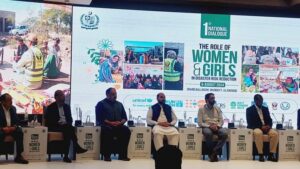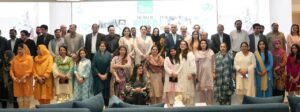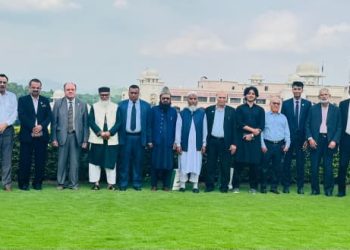ISLAMABAD( WNAM REPORT): Prime Minister’s Coordinator on Climate Change Romina Khursheed, Chair of the Women Parliamentary Caucus, emphasized that , “Women are not just victims of disasters; they are agents of change and resilience. Their unique perspectives and capacities must be integrated into our disaster management strategies to build a stronger, more inclusive Pakistan.” The event facilitated knowledge exchange on best practices, identified challenges and opportunities for enhancing women’s participation in disaster efforts, and developed actionable recommendations for gender- sensitive policies.
NDMA’s Gender & Child Cell (GCC), in collaboration with UNWOMEN Pakistan, UNICEF Pakistan, Catholic Relief Services, Islamic Relief, Hands, and Welthungerhilfe (WHH), hosted a successful “One-Day National Dialogue on the Role of Women and Girls in Disasters”. This event spotlighted the critical yet often underutilized contributions of women and girls in disaster risk reduction (DRR) and management. Participants discussed how women and girls possess invaluable knowledge and capacities that significantly enhance community resilience and recovery, yet their contributions are frequently overlooked in formal DRR frameworks. Chairman NDMA Lt General Inam Haider Malik and Prime Minister’s Coordinator on Climate Change Romina Khursheed Alam attended the Dialogue.
Chairman NDMA emphasized the importance of proactive responsiveness and social resilience in disaster management. He stressed the need for adaptive measures to address climate-related challenges. The Chairman acknowledged that disasters disproportionately affect vulnerable communities, particularly women and girls. However, their potential for resilience-building remains largely untapped within formal disaster risk reduction (DRR) and anticipatory action frameworks. He also highlighted that this platform aims to facilitate the sharing of experiences, identify best practices, and develop actionable strategies. Chairman NDMA underscored the critical contributions of women and girls, address the barriers they encounter, and advocate for gender-sensitive policies and practices in Pakistan’s DRR efforts.
Addressing as chief guest at a national dialogue on ‘Role of Women and Girls in Disaster Risk Reduction’, the PM’s climate aide highlighted that women, particularly those from rural or marginalised communities, hold invaluable local knowledge about environmental conditions, traditional practices and risk management. However, their leadership in these areas not only can help improves disaster management strategies but also fosters a more comprehensive understanding of community needs and vulnerabilities.
The PM’s Coordinator told the participants of the event. As the world grapples with increasing frequency and intensity of natural disasters, it has become clear that women and girls are not just beneficiaries but pivotal players in disaster risk reduction (DRR). Their unique contributions are essential for building resilient communities and ensuring effective disaster preparedness and response.
Suggesting measures to fully harness the potential of women and girls in disaster risk reduction, the PM’s climate aid Romina Khurshid said that it is crucial to enhance their participation in decision-making, policymaking and policy implementation processes at all levels, support and fund women-led disaster risk reduction initiatives and organizations, promote gender-sensitive approaches in disaster management policies and practices and ensure that women and girls have access to education and training related to disaster preparedness and response.
“The present government is highly concerned over the sufferance of the communities, which are frequently affected by climate change-caused disasters, particularly smallholder farming and marginalized communities with poor resources for post-disaster recovery and committed to building disaster resilience of them by providing them necessary knowledge, skill and resources,” Romina Khurshid Alam informed the participants.
She remarked that women and girls often serve as the backbone of their communities, particularly during disasters, particularly floods, cyclones and heatwaves. When empowered with knowledge, technical and financial resources, they could play a central role in managing household preparedness, disseminating risk information and providing critical support systems.
Their involvement in disaster risk reduction initiatives could also enhance community resilience and ensures that disaster management strategies are both inclusive and effective, Romina Khurshid Alam added.
The PM’s aide said further that recent case studies have demonstrated the significant impact of women-led initiatives in disaster scenarios.
From grassroots organizations in various disaster-vulnerable countries to community-based programs in [another region], women have proven their capacity to drive positive change, enhance risk communication, and support long-term recovery processes, she added.
“Empowering women and girls in DRR efforts can lead to innovative solutions and more responsive policies. Women’s involvement in policy-making and advocacy ensures that disaster management approaches address the diverse needs of all community members, promoting greater equity and effectiveness in recovery efforts,” she said.
This event marked a significant step towards empowering women in DRR, contributing to Pakistan’s overall disaster management capabilities. It was funded by NDMA, UNWOMEN, UNICEF, Catholic Relief Services, Islamic Relief, WHH, Federation Handicap International, HANDS, and STEP.








